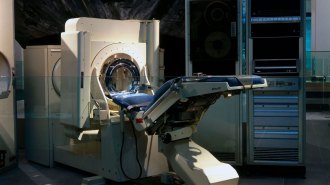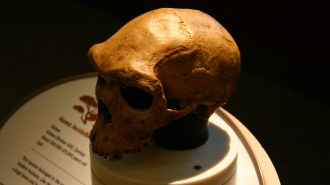Uncategorized
-
 Health & Medicine
Health & Medicine50 years ago, X-rays provided an unprecedented look inside the brain
CT scans can now image the whole body and are even used in other scientific fields such as archaeology, zoology and physics.
-
 Health & Medicine
Health & MedicineA classical lullaby helped reduce newborns’ pain during heel pricks
Methods to lessen pain for newborns during routine procedures include cuddling and a dose of a sugar solution. Music also appears promising.
-
 Climate
ClimateArctic sea ice may melt faster in coming years due to shifting winds
A complex dance between Arctic wind patterns and the Atlantic has limited the flow of warmer water north in recent years. That may be about to change.
-
 Anthropology
AnthropologyExtreme cold may have nearly wiped out human ancestors 900,000 years ago
Ancestral populations had rebounded by about 800,000 years ago, heralding the evolution of people today, a contested DNA analysis suggests.
By Bruce Bower -
 Archaeology
ArchaeologyAncient Egyptian jars hint at complex mummification balms
Residue from ancient jars holding the internal organs of the mummy Senetnay hints at early Egyptian trade routes and complex mummification practices.
-
 Health & Medicine
Health & MedicineThe weight-loss drug Wegovy may also help treat addiction
Recent studies in mice and rats suggest that semaglutide drugs, like Wegovy, can curb some addictions. Several human trials are underway.
-
 Neuroscience
NeuroscienceThree ways of rejuvenating aging brains may work via the same protein
Three brain rejuvenation methods may exert their effects through the same molecule, at least partly, which could lead to therapies for cognitive decline.
By Simon Makin -
 Health & Medicine
Health & MedicineMexican virologist Susana López Charretón uncovered rotaviruses’ secrets
Knowledge of the complex dance between virus and host cell has led to the development of life-saving vaccines.
-
 Health & Medicine
Health & MedicineWhat we still don’t know about Wegovy’s effect on strokes and heart attacks
A clinical trial suggests that semaglutide, a drug used to treat obesity and diabetes, may protect cardiovascular health in a broad group of people.
By Meghan Rosen -
 Chemistry
ChemistryChemists turned plastic waste into tiny bars of soap
Researchers developed a process to turn plastic waste into surfactants, the key ingredients in dozens of products, including soap.
-
 Neuroscience
NeuroscienceHere’s what lucid dreamers might tell us about our sleeping minds
Lucid dreaming could prove to be a powerful tool for probing dreams, one of the most universal yet elusive human experiences.
-
 Health & Medicine
Health & MedicineWhat to know about the new RSV vaccine for pregnant people
Data on the FDA-approved Pfizer vaccine are promising. Questions about safety and how it might be used in conjunction with another new RSV shot remain.